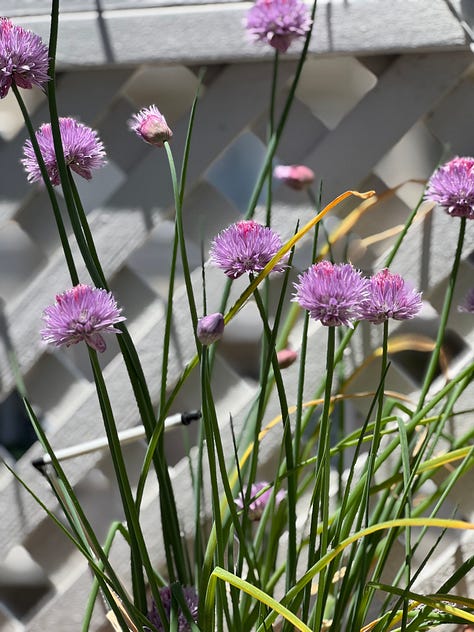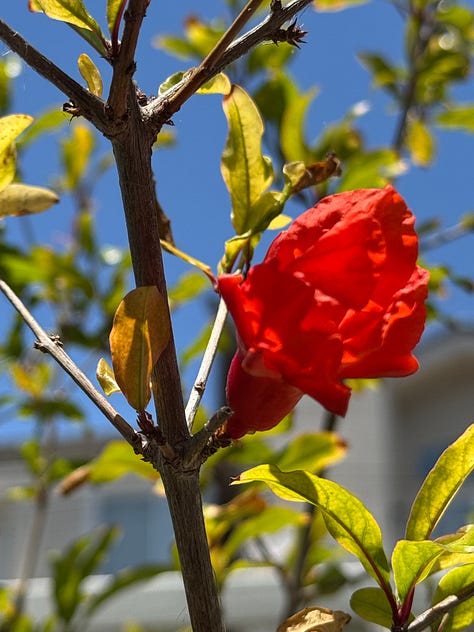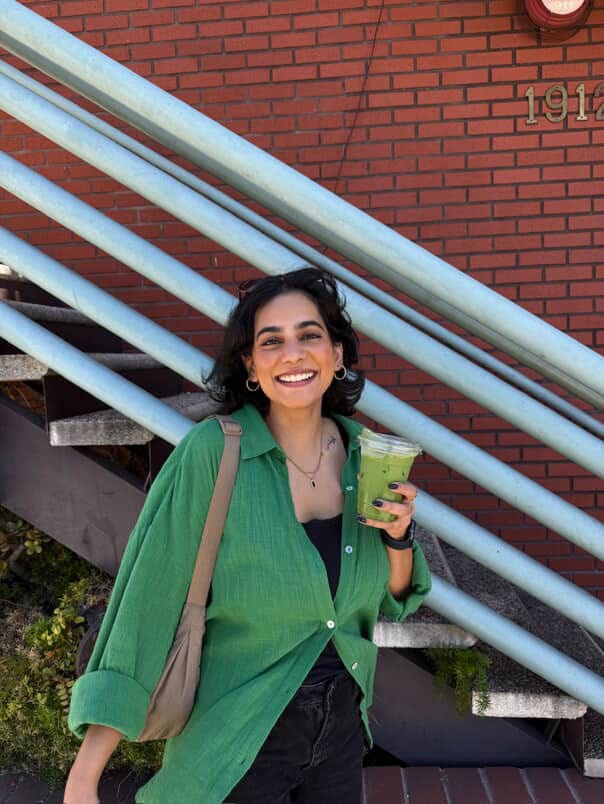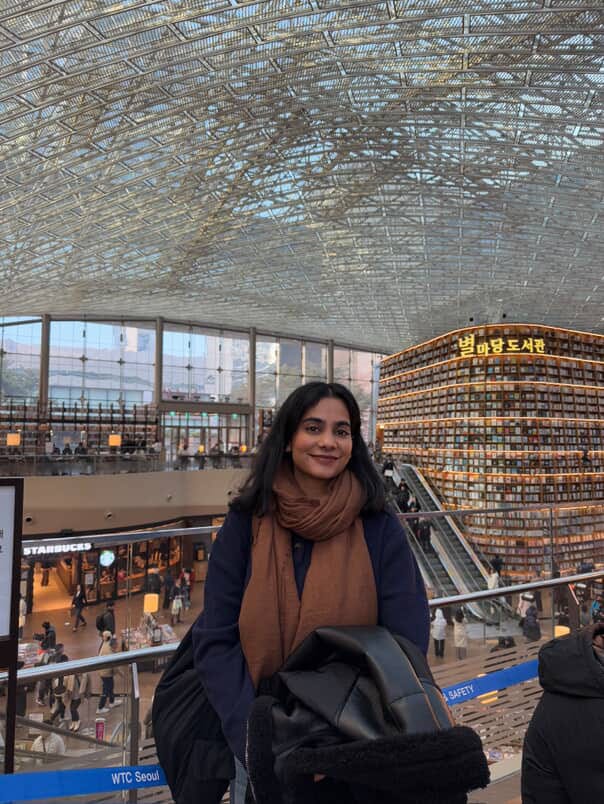Summer vibes are everywhere, from the flowers blooming in the garden, to the rising temperatures at the pool, to the exciting travel in the coming months. As for me, I’m loving watching the fruit growing in my balcony container garden, tending to it like a mother hen and using a tiny brush to pollinate the pomegranates. I’ve been dealing with a shoulder injury but after a couple of months of resting it, I’m finally able to be back at the pool swimming those meditative laps that I love so much. I do my best creative thinking while under water and away from devices. And I’ll be heading to Tanzania in July, and then rewarding myself with Europe in September after the launch of Saving Face.



With the launch of my fourth novel just two months away, this is when things start to feel real. Like, really real. Reviews are starting to go up on NetGalley and Goodreads (thank you to anyone who has left one). The audiobook is being recorded by the incomparable Soneela Nankani, who has narrated all my books thus far. But the best part is starting to schedule events because it means I get to interact with all of you in person or at least virtually, and nothing is better for an author. Below you’ll see what is coming up so you can mark your calendars.
How do I cope with the stress of an upcoming launch? Obviously, I garden. But the best and most effective strategy is to dive into my next book, and that’s what I’ve been doing. Putting my head down and hitting my word count goals as I create a new story that I love and hope you will too.
SAVING FACE Launch Party on 8/10
It is officially on the calendar and I hope you’ll join me and Lyn Liao Butler on August 10 as we celebrate the launch of Saving Face and Lyn’s latest The Fourth Daughter. The event is free to attend, but preordering a copy ensures you have a seat and don’t have to stand. It also really helps me get attention for publicity and marketing, so it would mean a lot if you could preorder and confirm your attendance using the link here. Diesel is also the place to pre-order signed copies of Saving Face, which can be shipped anywhere in the country.
My First In-Person Library Event on 8/13
As an immigrant kid, I basically grew up at the library, so it was a full-circle moment when I partnered with my local library to do a book event alongside two other extremely talented writers, Suzanne Park and Carolyn Huynh. This is going to be a fascinating discussion about culture, identity, and belonging and you don’t want to miss it. The event is free to attend, but please RSVP so the library can plan for snacks and beverages—two very important things when discussing books.
Virtual Library Event on 10/6
This one is open to everyone and you can attend from the privacy of your own home while in your loungewear, sipping your favorite beverage. Bestselling author Weina Dai Randel and I are meeting in conjunction with the Ashland Library to discuss all things books, publishing, and how culture influences our writing. You don’t want to miss one. Also, free to attend, but please RSVP here.
The Busy Badge & Hustle Culture
Somewhere along the way, “busy” became a badge of honor. A subtle signal that we’re important. Needed. Productive. Accomplished. In American culture especially, being busy is something we grow up admiring, aspiring to. We learn that our value lies in how much we can juggle—our worth measured in motion.
But lately, I’ve been thinking… were we taught the right thing?
There’s a quote I love—supposedly from Socrates, though no one can find definitive proof:
“Beware the barrenness of a busy life.”
Regardless of who said it, it’s been echoing in my mind more and more.
I used to live by the billable hour. As a lawyer, every six minutes of my day had to be accounted for—tracked, justified, billed. Six-minute increments. Imagine living your life like that. Constantly evaluating whether your last few moments were “worth” hundreds of dollars. And of course, the bar for what was considered worthwhile became higher and higher. What was clear was that I had to be doing something in order to feel like my time had been well spent. I had to be busy.
I didn’t realize how much that way of thinking seeped into my life outside the office. How I began to view my entire existence through that same lens: Was I productive enough? Did I earn my rest? Was this time well-spent? Had I done enough to deserve time to do something I enjoyed?
In the immigrant household I grew up in, rest and play weren’t really part of the vocabulary. We were raised to chase stability, success, safety. There wasn’t room for “indulgence.” And so, I built a life that looked very successful on paper—but the weight of that success began to feel like a heavy burden to carry.
And then… the pandemic.
The world slowed down in ways we never expected. At first, it was jarring. Disorienting, even. Especially for a society that is used to constantly being in motion in order to be considered valuable. But somewhere in the middle of all that uncertainty, a strange kind of clarity emerged. We started breathing again—literally and metaphorically. I saw people around me reprioritizing. Choosing themselves. Learning that meaning didn’t have to come from jam-packed calendars or color-coded schedules.
We rediscovered the beauty of going for walks in the middle of the day. Of cooking a meal from scratch. Of reading a book just because.
While people were holed up in their homes around the clock, I remember noticing that people had started dropping “busy” from their vocabulary. And it struck me, not only because the word had become so commonplace in our society that its absence was palpable, but because I had done the same thing years before.
Back in 2014, I was a partner at a law firm. I had done the unthinkable—returned to the world of billable hours after some years working in-house in Hollywood—and it felt like putting on an old, ill-fitting suit. It was lucrative, sure, because that was the only reason to make such a transition back to the prison I felt I had escaped years earlier. But in addition to the money, in many ways it checked all the boxes I’d been told to value: security, productivity, prestige, and yes, being busy. But the environment was toxic and I was unhappy. Deeply so.
Still, the scarcity mindset that so many of us children of immigrants carry whispered: “You don’t walk away from a good paycheck. You stick it out. You make it work.” And the loudest voice: “Your parents sacrificed so much for you to be able to live this financially comfortable life.”
I tried to stick it out. I really did. If you’ve heard voices like that before, you know how insistent they can be.
But something inside me kept nudging. Asking why I was clinging so tightly to this idea of being “busy” being a marker of my self-worth. I had wrapped so much of my identity in it. I have vivid memories of comparing deadlines with my colleagues, each of us overtly lamenting how many we had, but covertly wanting to ensure that we had the most. These deadlines were a sign that we were important, in-demand, and could be trusted to juggle more than our peers. It didn’t matter that our lives outside of work had lost so much meaning. What mattered was that when we walked through the doors of the firm, we were someone whom people admired, and that level of admiration was in direct proportion to the amount of our lives that we’d committed to the firm.
Back then, articles were starting to pop up—HuffPost and many others—talking about how we wear “busy” like a status symbol. I’d read them and wince in recognition. Like so many others, I was using “busy” as a humble brag, but also as an excuse—for not writing, for not watching the shows I wanted, for not doing things that brought me joy.
One article really hit me hard: It said that if you’re too busy for the things you love, it’s not a time issue—it’s a priority issue. This put the responsibility back into my hands and I could no longer blame my inability to read or play tennis or write or volunteer on my clients or colleagues. If my days were not spent doing what I wanted to do, then the blame fell squarely on my shoulders because I chose to fill my days with work and other things that earned me the “busy badge.” I cannot count the number of times I had finished my work for the day but stayed at the office because I had looked around and “it felt too early for me to leave.” I allowed myself no benefits or rewards for my efficiency, but I realized that I could only blame myself for that. As much as I disliked having an article call me out like that, I do like a good reframing.
So, I stopped saying I was busy. I started saying I was productive.
This reframing allowed me to be more intentional and more present. But it also forced me to think about how I spent the sixteen hours I was awake each day. I went back to writing—slowly, yes—but consistently. I stopped chasing prestige projects that didn’t light me up. I began honoring the small joys: binge-watching a new series, getting lost in a book, hours on the tennis court, cooking a meal from scratch. I traded external validation for internal peace, and eventually, I left that soul-draining job. It came with a steep pay cut, but the freedom it bought me? Priceless. At that point, I’d already learned that the busy badge was a pyrrhic victory.
So when the pandemic forced everyone around me to have that same type of awakening, I was relieved. We were all now on a level playing field rather than me alone having to fiercely guard myself from falling into that trap again.
Of course, nothing is linear. Lately, I’ve been hearing that “busy” buzz again. In so many areas of my life, I see it creeping back into conversations—used once more as a marker of success, importance, and relevance. An old version of me would’ve felt the urge to compete, to rattle off my own overloaded to-do list just to prove I still mattered.
But I’m not that woman anymore.
Today, when I hear people lead with how busy they are, I feel something different: gratitude. Gratitude that I no longer need to prove my worth through how full my calendar is. That I don’t have to explain or justify how I spend my days. That I know what makes me feel alive, and I make space for those things. And I know that regardless of where society goes from here and how long the busy badge stays relevant again this time, I know that it’s not something that I want to measure my own life by, and I will do as much as I can to protect myself from that energy that no longer serves me.
I really hope we don’t forget the lessons of the pandemic—the ones that reminded us that slower isn’t lazy. That presence isn’t wasted time. That rest is revolutionary in a world that tells us to hustle until we collapse.
Choosing yourself and your inner peace over and over again? That’s the real badge of honor.
Bookish People to Know
This month I’m featuring Dubai-based Bookstagrammer Anvita. Like me, Anvita has moved a lot during her life and travels often and it’s always fun to check out her feed and see where in the world she is on that day and what she is reading. Her taste is impeccable and her YouTube videos are full of charm, so please give her a follow.


Here’s a chance to get to know her better and pick up some of her favorite books.
Asha, tell us a little about yourself, including a fun fact we might not otherwise know from your social media.
Hi! My name is Anvita Patwari and I'm a 26 year old writer who loves talking about books, traveling, and kpop + kdramas. Some fun facts that people might not know about me are that I'm a middle child (older sister, younger brother) and I love learning languages! I've been learning Korean on and off for the last ten years and have been learning Mandarin for a little over a year now.
I also love learning languages, What inspired you to start a bookstagram account?
The short answer is that I needed to talk about the books I was reading with people who had read the book, so my sister suggested I start a bookstagram.
The long answer is that I fell in love with reading thanks to a scholastic book fair at my boarding school, but wasn't able to make time for reading during my undergrad so I read maybe two books in the first three years of college. Then during quarantine in 2020, one of my friends pestered me into reading a book that she had recently read because she wanted to discuss it with someone. That kickstarted my love for reading again and I started consuming all the books I had missed out on while I was busy with my undergrad. But then there was the problem that I didn't have people to discuss those books with, because I was finishing books faster than my friend or my sister since I had more time. So after I kept pestering my sister to read the multiple different books that I finished and wanted to discuss with her, she suggested I start a bookstagram so I can find people who've read those books so I can analyze and fangirl about the books with them.
Sounds like your sister gave you some sage advice and I definitely know the feeling of finishing a book and wanting to discuss it with someone but no one else has read it recently. What is a book that has stayed with you long after the last page, and what about it is so memorable?
In the Dream House by Carmen Maria Machado. I read this book four years ago and can still vividly remember where I was, what I was doing at the time. This book felt so haunting to read, not because it's horror but because it's a memoir. It's written in such a unique way, where each short story (or maybe it’s chapter?) uses narrative tropes and the concept of dream houses to portray the author's experience in an abusive queer relationship. This book was memorable for me because of the topic and the vulnerability in its discussion, the unique writing style, and because I can still remember the way it felt like the walls were closing in on me when I read it.
What is a book that has made you feel the most seen?
Most seen is TJ Powar Has Something To Prove by Jesmeen Kaur Deo but I’ll talk more about that one in the next question.
Another book that made me feel seen was a graphic novel I read recently called Fitting Indian by Jyoti Chand and Tara Anand. The book is a very raw and real portrayal of mental health struggles as a young adult, especially showcasing the pressures of striving to be the perfect Indian daughter. This book did a great job of displaying mental health stigmas and their harm in Indian communities. Although my mental health issues were nothing like the main character's, I still really resonated with her thoughts and her community's reaction/ response to her struggles.
What is a book you wish more people knew about?
TJ Powar Has Something To Prove by Jesmeen Kaur Deo. I read it last year and it easily became one of my favorite books of all time. It's so well written and covers topics (body hair stigma, beauty standards) that I'm really passionate about. I loved the way TJ showed her conflicting thoughts regarding beauty standards and respect and its connection to body hair and image. And the way her relationship with herself changed over the course of the book. The book also has a little bit of everything that I love in romance even though it's a young adult contemporary book - strong female main character, romance subplot, rivals to lovers, banter, and so much more. Every person I have pestered into reading this book has told me they loved it!
What was the last book that made you laugh?
Well, Actually by Mazey Eddings.
What is the last book that made you cry?
This is Me Trying by Racquel Marie.
What types of books would you like to see more of on the shelves?
South Asian books with more intersectional representation! Like South Asian books with queer main characters, South Asian books with disabled main characters, South Asian books with characters with mental health issues, etc.
Recent Read + Giveaway
As an author, I still fangirl (hard) over other authors because, deep down, I will always be as much a reader as I am a writer. And there’s nothing better than reading someone’s work that leaves you both speechless and inspired. That’s exactly how I feel after reading each of Vaishnavi Patel’s books—especially her latest, Ten Incarnations of Rebellion.
She takes stories from Hindu mythology, like the Mahabharata and Ramayana—which are still underrepresented on bookshelves—and gives them a refreshing spin through her female-focused lens and incorporation of modern-day themes. For those of us who grew up with these stories, she offers a unique perspective that will make you crave those childhood VHS tapes you used to watch. For those new to Hindu mythology, you’ll leave her books wanting to learn more.
I also marvel at how she plays with structure in her novels. Her mind works creatively in a way mine never will, and I truly admire and respect her gift. In Ten Incarnations of Rebellion, she does this masterfully by structuring the novel around the ten incarnations of Vishnu. The book has Man in the High Castle vibes, set in an alternate India where, in the1960s, the country is still under British rule. These alternate reality stories are so thought-provoking. From the very first pages, you’ll find yourself rooting for Kalki and for India—and wanting to witness the liberation of both.
Synopsis: From the New York Times bestselling author of Kaikeyi comes an epic and daring novel that imagines an alternate version of 1960s India that was never liberated from the British, and a young woman’s struggle to change the tides of history.
Kalki Divekar grows up a daughter of Kingston—a city the British built on the ashes of Bombay. The older generation, including her father, have been lost to the brutal hunt for rebels. Young men are drafted to fight wars they will never return from. And the people of her city are more interested in fighting one another than facing their true oppressors.
When tragedy strikes close to home, Kalki begins to play a dangerous game with small acts of resistance, tempered by cautious, level-headed Yashu and fortified by Fauzia, whose dreams of the future awaken Kalki’s heart. Together, they found Kingston’s new independence movement, obtaining jobs working for the British while secretly planning to destroy the empire from the inside out. But one wrong move means certain death, and when facing threats from all quarters, Kalki must decide whether it’s more important to be a hero or to survive.
Set over the course of a decade and told as ten moments from Kalki’s life that mirror the Dashavatara, the ten avatars of Vishnu, Ten Incarnations of Rebellion is a sweeping, deeply felt speculative novel of empowerment, friendship, self-determination, and the true meaning of freedom.
If I haven’t convinced you to buy this book yet, then how about a free copy? Vaishnavi and I have a great giveaway going on right now where you can win her book and my last one (both signed). This giveaway is open through June 9, so head over to IG to enter.
Thank you all for joining me on this journey, and I hope it’s the start to a great summer!
xo,
mansi





